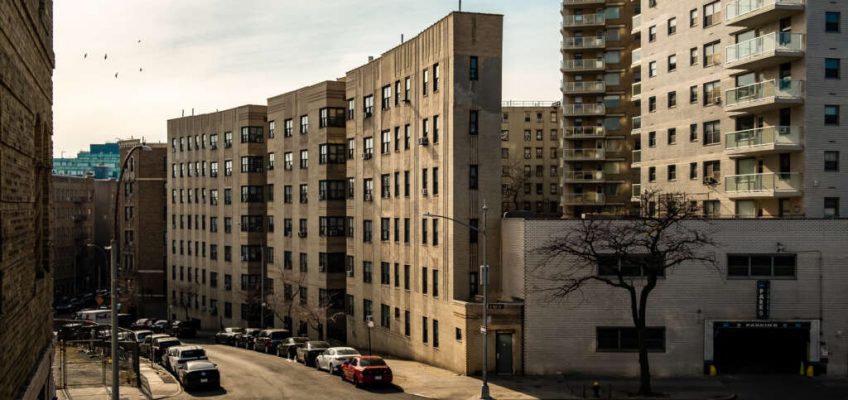“We absolutely should weed out exploitative landlords, but we also need policies that support responsible owners. Otherwise, small landlords give up, banks take over, and buildings end up owned by large corporations.”
Apartment buildings near Carroll Place and East 165th street in the Bronx. (Adi Talwar/City Limits)
Lately it seems like “landlord” has become a dirty word in New York City, and all of us, good and bad alike, are being painted with the same broad, hostile brush. I’m a Democrat living in Manhattan, and my husband and I have always believed in fair housing, treating tenants with dignity, and keeping the city vibrant.
Yes, some landlords are greedy and irresponsible. But when policies lump all landlords together, they punish small, community-focused owners like us alongside the worst actors. We need a new approach, one that balances tenant rights while driving landlords to maintain responsible practices.
We don’t own fair-market apartments. We manage 100 units across two buildings in the Bronx, all of which are rent stabilized or occupied by Section 8 tenants. That means we already operate under strict rent restrictions and oversight. New York’s “Good Cause Eviction” law doesn’t directly impact our business, but the mindset behind these sweeping policies is spreading, and it’s setting up the entire housing market for worse outcomes.
People think landlords love to evict tenants. We don’t. Eviction is a nightmare; it means months, often over a year, of paying legal fees and going to court, all while the tenant remains in the apartment without paying rent. Even after court approval, we often wait months for a marshal to enforce it. During that time, we still pay taxes, utilities, insurance, and the mortgage.
From 2014 to 2021, the average annual rent increase for our regulated units was around 1 percent, while operating costs climbed steadily. That left us in a fragile position when COVID hit: tenants stopped paying rent, eviction moratoriums prevented enforcement, and the court backlog meant cases dragged out even longer.
We’re still digging out: the 2025 Rent Guidelines Board study showed Bronx landlords’ net operating income rose only 0.8 percent, far below citywide averages. At the same time, the city keeps layering on good, but costly mandates—we recently replaced an elevator to meet inspection rules and are now making critical roof repairs.
We want to invest more. We often modernize kitchens and bathrooms for long-term tenants, and we’d love to improve common areas and energy efficiency, not just because it’s good business, but because we believe, as Matthew Desmond wrote in “Evicted”: “a stable and decent home is said to be a fundamental requirement for individuals and families to thrive.” Landlords shape communities and support livelihoods in ways often overlooked, by tenants, policymakers, and even landlords themselves.
But how are we supposed to make these improvements if we can’t recover the costs? The nominal rent increases and lengthy eviction process drain time and resources that could otherwise go toward building upkeep. This lack of incentive creates an environment where mediocrity becomes the default, not because landlords don’t care, but because they’re stuck.
That’s where the cascade happens. If fair market landlords see the same constraints coming their way, they won’t invest in their properties. We absolutely should weed out exploitative landlords, but we also need policies that support responsible owners. Otherwise, small landlords give up, banks take over, and buildings end up owned by large corporations. Then everyone wonders where the community-based landlords went and why the sense of community disappeared with them.
Government ownership isn’t the answer either. Bureaucracies are often impersonal and inefficient. Yes, there’s an inherent tension in a capitalist system where landlords profit from a basic need like housing. But that doesn’t mean the solution is to make it unprofitable. Guardrails should prevent abuse, but they also must allow landlords to run sustainable, successful businesses.
As a Democrat who believes deeply in affordable housing, I’m worried. Housing quality doesn’t improve through punishment alone. It improves when governing policies create the incentives and means for landlords to reinvest. We need to understand why tenants fall behind, offer small but meaningful incentives for maintenance and upgrades, and streamline the eviction process without sacrificing fairness.
Housing policy can’t be one-sided, that’s lazy and shortsighted. It’s not enough to squeeze landlords and hope they do the right thing while their finances collapse. If we keep ignoring these realities, we’ll end up with exactly what we say we don’t want—deteriorating buildings owned by institutions, not neighbors.
I urge our city’s leaders to look at the housing crisis from all sides, not just from the angle that earns applause or political points. Lasting solutions will only come when we acknowledge the challenges facing both tenants and the small landlords who house them.
Kelly Feili lives in New York City and works in cybersecurity, where she has spent much of her career focused on public policy. Her family owns and manages two rent-stabilized buildings in New York City. This is her first op-ed on housing policy, a topic she has grown passionate about through personal experience.
The post Opinion: NYC Needs More Than Tenant Protections—It Needs a Balanced Approach to Housing appeared first on City Limits.


Leave a Reply